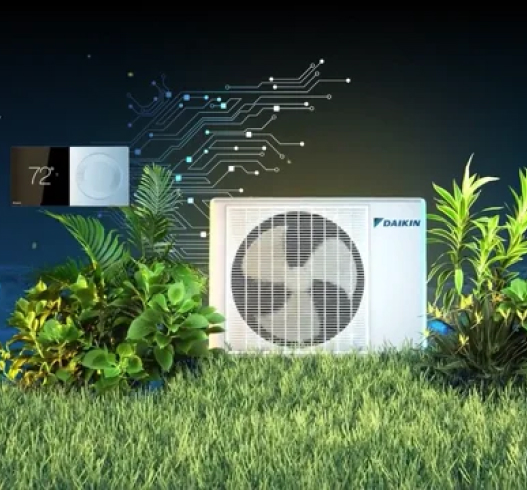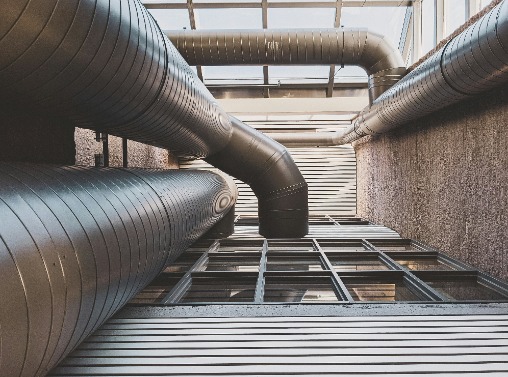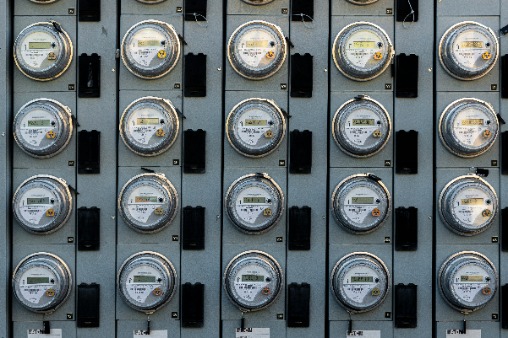Learn about modern HVAC systems

Traditional HVAC systems utilize compressors that only operate in on/off mode; it Is either 100% on and utilizes Its maximum capacity or shuts off entirely when the desired temperature is reached. Some air conditioners and heat pump systems, like the Daikin Fit, utilize Inverter adaptive technology. This allows the system to respond to the actual real-time demand by modulating Its output based on the outdoor and Indoor conditions at the time. By doing so, Inverter adaptive technology helps save money on energy or utility bills - up to 30%.
With inflation and rising costs hitting your bank account hard, saving money is on everyone's mind. Inverter adaptive technology may help deliver the type of indoor comfort and savings that you and your family never thought possible with heating and cooling systems.
Inverter Technology Basics
- Part of the electrical components of an air conditioner or heat pump.
- Controls and modulates the electrical current running into the compressor’s motor, the heart of the indoor comfort system.
- Designed to adjust how much energy is needed to maintain indoor comfort based on the specific requirements of your space.
- Makes electric heat pumps and air conditioners more efficient than traditional on/off systems.
- Provides heat pumps with the ability to operate under cold climates conditions (some units operate efficiently down to -13F). This is a big part of supporting electrification of homes and reduce the impact of your heating system on the environment.
- Inverter technology helps ensure a consistent temperature while reducing up to 30% on energy consumption.
Seven Benefits of Inverter Technology
1. Low Monthly Energy Bills
For the typical family in the United States or Canada, heating and cooling systems require substantial energy consumption, often revealed in the monthly utility bill. Inverter adaptive systems are an energy-saving technology that helps improve the energy efficiency in HVAC systems when compared to single and two-stage systems. Indoor temperatures are adjusted by changing the speed of the motor, maintaining your comfort while operating at the most efficient level possible.
2. Consistent Indoor Temperature
Inverter adaptive technology helps prevent the uncomfortable temperature swings typically experienced with non-inverter heating and cooling systems. An inverter system can reach your comfort setting quickly and helps to minimize temperature fluctuations within your home.
3. A Comfortable Home
A non-inverter system will turn ON to cool the air down until it reaches the desired set point, then turn OFF to avoid over-cooling. However, between the time the system shuts OFF and restarts, the humidity levels begin to build again within a home. For homeowners in hot and humid climates, an inverter system may result in more consistency in indoor humidity levels. The continual energy-conserving operation continually dehumidifies the home to balance the heat load.
4. Year-Round Comfort with Electric Heat Pumps
Modern systems using Inverter adaptive technology can be used “all year round.”. While heat pumps of the past were effective at heating homes when outside temperatures were about 40°F - 50°F, some of today’s systems are designed to operate well below freezing temperatures. These electric, cold-climate heat pumps, when sized properly sized, provide the power required to comfortably heat indoor spaces. In more and more cases, an electric heat pump may reduce or eliminate the need for a fossil fuel heating system. As a result, heat pumps with adaptive inverter technology become an attractive, clean, efficient, and comfortable solution for homeowners wanting a smart heating system without the typical odors, inconvenience (still waiting on that oil delivery truck?), and energy loss of fossil fuel burning systems.
5. Low Operational Sounds
Inverter adaptive systems are quiet. They are engineered to achieve low operating sound levels by running at an energy-conserving speed. It also eliminates the loud, constant ON/OFF of a non-inverter system. For example, the Daikin Fit operates between 58-60 decibels, quieter than a common electric toothbrush, which operates at about 60-75 decibels. Inverter technology provides homeowners with a new level of acoustical comfort, even if the outdoor component must be installed close to a door or window.
6. Sustainable Comfort
Generally, the wear and tear on an inverter adaptive system is reduced compared to that of a jarring 100% ON/OFF system without inverter adaptive technology. The continuous and steady adjustments are easy on your cooling system’s compressor and may help contribute to longevity and durability.
7. Works Well with Solar Power
Inverter compressors are well-suited for solar power usage due to the reduced start-up amperage (amp) draw required. A low starting power draw is an important consideration when incorporating indoor comfort equipment into a solar energy system.
Inverter Benefits
In this article
Connect on Social Media
 Follow on Facebook
Follow on Facebook
 Follow on YouTube
Follow on YouTube
 Follow on Instagram
Follow on Instagram
 Follow on X
Follow on X
 Follow on TikTok
Follow on TikTok
 Follow on Pinterest
Follow on Pinterest

Looking for help now?
Enter your zip code to search for Daikin Contractors in your area.
Learn More
Learning Center Content
Stay informed about home comfort technology, when to upgrade, energy efficiency, and reducing your energy bills.





























